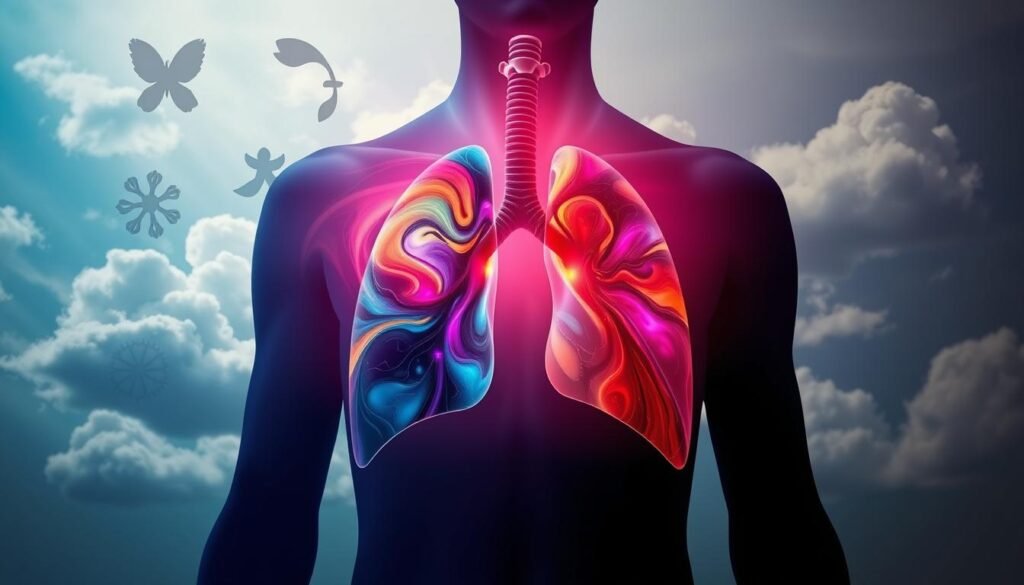About 60 in 100 people with lung cancer lose their appetite and weight when diagnosed. This is surprising, as appetite changes are often not seen as a sign of serious health issues. But, they are closely related to lung cancer. Spotting these changes early can greatly help in treatment.
Understanding lung cancer symptoms is key, especially how changing what you eat can warn us of this deadly disease. Paying attention to these changes means we can get people help sooner. This can really make a difference in their health. So, it’s vital to know that losing your appetite can be a sign of lung cancer.
Key Takeaways
- 60% of lung cancer patients experience appetite loss and significant weight loss at diagnosis.
- Changes in appetite can indicate serious health conditions, including lung cancer.
- Recognizing early symptoms may lead to timely treatments and better outcomes.
- Lung cancer is more likely to coincide with weight loss compared to other cancer types.
- Seeking help for appetite changes can improve quality of life for those affected.
Introduction to Lung Cancer and Appetite Changes
Lung cancer is a major health issue around the world. It starts when harmful cells grow in the lungs. This leads to many health problems. One key symptom is changes in appetite, affecting nearly 60% of patients. This can reduce their food intake and harm their well-being.
Several factors cause appetite changes in lung cancer patients. The cancer can change how the body works, making patients eat less. They may also need different nutrients, which complicates eating habits. Understanding these changes is crucial for early detection and treatment.
Keeping an eye on appetite is important. It can signal the presence of lung cancer. Many patients face severe weight loss and muscle decrease, known as cachexia. Up to 66% of patients in late stages may not feel like eating. This highlights the need to address appetite changes quickly. To learn more about lung cancer and weight loss, click this link.
https://www.youtube.com/watch?v=ihCnDjyJv5c
Knowing how lung cancer and appetite changes are related helps manage diet better. This improves patients’ lives. Handling these symptoms can greatly aid in their recovery and health.
Understanding Lung Cancer Symptoms
Lung cancer symptoms can vary and happen quickly or slowly. Spotting these signs early is crucial for treatment. Knowing what to look for helps with fast detection and better outcomes.
Common Symptoms of Lung Cancer
- Persistent coughing: A cough that lasts may mean lung issues.
- Chest pain: Feeling discomfort in the chest can be a warning sign.
- Shortness of breath: Trouble breathing could be due to cancer blocking air.
- Coughing up blood: Seeing blood when you cough needs quick action.
- Pain in other areas: If the cancer spreads to bones, it can hurt more.
Early Signs to Watch For
Spotting lung cancer early can change how effective treatments are. Look for signs like:
- Unintended weight loss: Dropping pounds without trying suggests health issues.
- Alterations in appetite: Eating less or losing interest in food points to problems.
- Fatigue: Constant tiredness, when it’s not from other causes, signals trouble.

Knowing lung cancer symptoms and its early signs is key. Finding it early can lead to better treatments and might help people live longer.
Changes in Appetite and Lung Cancer
People with lung cancer often face changes in appetite. As the cancer grows, the body’s metabolism changes, leading to less hunger and weight loss. In fact, over 60% of patients lose a lot of weight when they are first diagnosed. This can make their overall health and life quality worse.
Cancer cells can mess up normal hunger signals by releasing certain proteins. This makes the body not recognize when it’s hungry. Moreover, treatments like chemotherapy and radiation can also reduce appetite. Certain treatments for non-small cell lung cancer can particularly lower appetite and cause nutritional problems.
In the late stages of lung cancer, appetite loss becomes more evident. Studies suggest that feeding tubes or IV nutrition doesn’t really help terminally ill patients live longer or stronger. Many patients prefer minimal fluid intake, showing the complicated link between nutrition, appetite, and care at the end of life.
If you’re dealing with these issues, it’s crucial to talk to healthcare experts for advice on eating right. Knowing how lung cancer affects appetite can help patients improve their diet and well-being. For tips on managing eating problems, check out this resource.
| Factor | Impact on Appetite | Potential Solutions |
|---|---|---|
| Cancer Progression | Disruption of hunger signals | Consult a dietitian for personalized plans |
| Treatment Effects | Nausea and taste alterations | Small, frequent meals; include preferred foods |
| Emotional Stress | Decreased motivation to eat | Support from family and friends |
| End-of-Life Care | Potential discomfort with invasive feeding | Focus on comfort and quality over quantity |
Causes of Decreased Appetite in Lung Cancer
Understanding why appetite drops in lung cancer patients is important. It’s because of many factors. Patients face physical, emotional, and treatment-related hurdles that affect their eating.
Physical Changes from Cancer
Cancer causes physical changes that impact eating. Tumors can make it hard to digest food, causing nausea or trouble swallowing. This makes it hard for patients to get enough calories.
Many patients deal with cachexia, common in late-stage cancer. It leads to weight and muscle loss. This makes proper nutrition even harder to achieve.
Effects of Cancer Treatments on Appetite
Cancer treatments also play a role in reducing appetite. Chemotherapy and radiation therapy often cause side effects. These can make patients not want to eat.
Patients may feel nauseous or lose their sense of taste from radiation. This makes it tough to keep up with nutritional needs. As a result, many lose more weight.
Emotional Impact on Eating Habits
A lung cancer diagnosis can affect emotions, impacting eating habits. Patients might feel stressed, anxious, or depressed. These feelings can lower their appetite.
It’s vital to tackle these emotional issues in lung cancer care. This helps ensure patients take in enough calories and potentially avoid malnutrition.

| Factor | Impact on Appetite |
|---|---|
| Physical Changes | Digestive difficulties leading to nausea and swallowing issues |
| Cancer Treatment | Side effects such as nausea and changes in taste from chemotherapy and radiation |
| Emotional Factors | Stress, anxiety, and depression reducing the desire to eat |
| Cachexia | Significant weight loss and malnutrition impacting overall health |
Appetite Loss in Lung Cancer Patients
Losing appetite can be a big problem for people with lung cancer. It can hurt their health and how they feel every day. Knowing how common this problem is can help us understand it better. A lot of lung cancer patients find they don’t feel like eating during treatment.
Statistics on Appetite Loss
Many studies show that losing appetite is common in lung cancer patients. Around half to 80% might have trouble eating because of their illness or treatment side effects. This shows why it’s important to watch what they eat. This can help avoid problems from not eating enough.
How Appetite Loss Affects Nutritional Intake
When patients lose their appetite, eating right becomes very important. It’s hard for them to get enough calories, protein, and water. Eating small meals often during the day can help. Also, trying cold or room-temperature foods might work better for those who can’t stand strong smells.
Working out might help them feel hungrier. This allows them to eat better. Nutritional drinks are an easy way to get more calories without much work. But, forcing them to eat can cause stress and make eating problems worse.
Adding high-calorie snacks and using butter or oils to cook can add more calories. Getting enough protein helps the body fix itself, especially after treatment. Drinking lots of water, about 64 ounces a day, is key. Eating poorly can cause weight loss and make them feel more tired.
Trying different spices and flavors can make food taste better. Getting advice from dietitians can improve how they eat. It’s important to deal with appetite loss early. This can lower health risks and help them feel better overall.

| Intervention | Description |
|---|---|
| Eating Small Meals | Having 6 to 8 small meals instead of 3 large ones can help increase overall calorie intake. |
| Cold Foods | Serving food cold or at room temperature may improve appetite for those sensitive to smells. |
| Nutritional Supplements | Using drinks and shakes provides significant calories with little preparation. |
| Protein Rich Foods | Ensuring an adequate intake of protein for muscle repair and maintenance. |
| Hydration | Drinking at least 64 ounces of water or fluids daily to support overall health. |
Understanding Appetite Changes in Lung Cancer Treatment
Lung cancer treatment can bring significant changes in appetite. Patients might see various side effects that change how they eat and enjoy food. It’s key to grasp these issues to manage nutrition well during treatment.
Impact of Chemotherapy on Appetite
Chemotherapy often affects appetite. Many patients deal with nausea, vomiting, and a change in how food tastes. These issues can make eating less appealing, which affects nutrition. As many as 60 in 100 patients with advanced cancer might lose their appetite. Foods might start to taste metallic, making once-loved dishes taste bad. Knowing about these side effects can lead to better nutrition plans. For more info, check out this study.
Radiation Therapy’s Effects on Eating
Radiation therapy, especially near the esophagus, can make it hard to eat. It may cause pain when swallowing or make the mouth dry. These side effects, much like those from chemotherapy, can change a patient’s desire to eat. Recognizing these issues is crucial to avoid malnutrition. Some might also enjoy food less because of taste changes or eating discomfort.
Both chemotherapy and radiation highlight the importance of specialized nutrition plans. Eating smaller meals more often and choosing high-protein, high-calorie foods can help. These strategies aim to ease the challenges of appetite changes.
Managing Appetite Loss in Lung Cancer
Appetite loss in lung cancer is tough for patients and their families. Knowing how to handle nutrition is key to keep up energy and stay positive. Up to half of the people with lung cancer face appetite problems. It’s critical to tackle these issues quickly.
Nutritional Strategies to Combat Appetite Changes
It’s important to use nutritional tactics to handle appetite loss in lung cancer. Here are some tips:
- Small, Frequent Meals: Eating smaller meals more often helps. It’s easier than trying to eat three big meals.
- High-Calorie Foods: Choose foods like nuts, avocados, and full-fat dairy. They pack more calories in small amounts.
- Enhancing Flavor: Add herbs, spices, or marinades to improve taste, especially if treatment affects how food tastes.
- Stay Hydrated: Drinking enough is crucial. Smoothies or high-protein drinks can help with both hydration and nutrition.
- Engaging with Food: Getting involved in meal planning and prep can spark an interest in eating.
Seeking advice from places like the American Cancer Society or the University of Texas MD Anderson Cancer Center is useful. They can offer specific guidance on nutrition.
Support from Healthcare Providers
Help from caregivers and medical teams is vital in managing appetite loss. There are many ways to get support:
- Dietitians: Dietitians can create meal plans that meet your dietary needs and likes.
- Psycho-social Support: Emotional issues can make appetite problems worse. Mental health experts can help cope with these feelings.
- Medical Interventions: Talking about appetite-boosting medications or ones that help with nausea is important for comprehensive care.
- Community Support: Joining groups like MyLungCancerTeam gives a chance to share coping strategies with others in the same boat.
If you’re losing weight without trying or your appetite isn’t getting better, tell your healthcare team. It’s key to preventing other health problems. This helps improve life quality for those fighting lung cancer.
Appetite and Lung Cancer Prognosis
Research shows that appetite greatly affects lung cancer patient’s prognosis. It’s key to know how nutrition impacts treatment outcomes. Keeping a healthy appetite is vital for both physical health and improving survival odds during cancer therapy.
Correlation Between Nutrition and Treatment Outcomes
About 61% of advanced non-small cell lung cancer patients are malnourished. Poor nutrition can make treatment side effects worse, leading to more complications and lower survival rates. A bad appetite can stop patients from getting enough nutrition, creating a harmful cycle for health.
Studies show the link between appetite and lung cancer prognosis is critical. It’s important to tackle nutritional shortfalls with the right steps.
Impact of Weight Loss on Prognosis
Unintentional weight loss is common in 50% of lung cancer patients, not from dieting but the illness itself. This kind of weight loss, or cancer cachexia, causes a loss of muscle mass and lowers physical abilities. Handling weight loss with appetite enhancers and Medical Nutrition Therapy can improve life quality and patients’ chances.
It’s crucial to understand and act on appetite changes for better results.
| Statistics | Percentage |
|---|---|
| Patients with malnutrition (advanced non-small cell lung cancer) | 61% |
| Involuntary weight loss occurrence in lung cancer patients | 50% |
| Impact of fluid deficit on metabolic function | 5% decrease per 1% body weight |
Appetite Changes as a Sign of Lung Cancer
Appetite changes are a key sign of lung cancer, often leading to early discovery. These changes can make people seek help sooner, improving their treatment options. Studies show that nearly 9 out of 10 people with advanced lung cancer notice a drop in appetite. This puts them at risk for more health issues.
The link between appetite changes and lung cancer is strong. Fatigue, pain, and emotional stress all play a role in eating less. Fatigue affects 57 to 100 percent of patients, decreasing their energy and will to eat. With less appetite, patients get fewer nutrients, weakening their immune system and overall health. Before treatment, about 34 percent have anemia, and after chemotherapy, it jumps to 66 percent. This shows how crucial good nutrition is during this time.
Moreover, having trouble breathing makes eating harder. It takes extra effort to eat and breathe, causing some to avoid meals. This leads to weight loss, both before finding out they have cancer and while getting treated. Adding high-protein foods, like eggs, meat, or beans, helps. These foods help keep strength up during treatment. For ideas on better nutrition during treatment, visit nutrition guidance for lung cancer recovery.
Finally, knowing that appetite changes can signal lung cancer is empowering. When these changes are noticed, getting professional advice can enhance health outcomes and life quality.
Support for Those Experiencing Appetite Changes
Changes in appetite can be hard for those with lung cancer. A strong support network is crucial. It helps individuals navigate these tough times. Family and friends offer both emotional support and practical help. This makes people with lung cancer feel less alone. Recognizing the importance of support for appetite changes builds resilience.
Getting Help from Family and Friends
Lung cancer’s emotional effects can reduce appetite. Here’s how loved ones can help:
- Engage in open conversations about eating habits to identify preferences and concerns.
- Encourage a relaxed meal environment, which can enhance appetite.
- Offer to share meals together, reducing feelings of isolation.
- Participate in healthy cooking together, making it a rewarding experience.
- Support gentle exercises, like walking, which may improve appetite.
Resources for Nutritional Guidance
Getting correct info can help people manage their dietary challenges. They can find valuable nutritional guidance from various places:
- Community support services or food banks for individuals struggling to access nutritious food.
- Books and websites dedicated to cancer nutrition which provide strategies for eating well.
- Consultations with dietitians or nutritionists who specialize in cancer care.
- Anti-nausea medication recommendations from health professionals for persistent symptoms.
- Advice on maintaining a nutritious diet with high-calorie drinks or smaller, frequent meals.
Conclusion
Understanding changes in appetite is key for spotting lung cancer early. It’s very important for managing the disease well. Loss of appetite impacts many lung cancer patients, hurting their nutrition and life quality. A study shows 62% of patients lose their appetite when they enter palliative care. This fact underlines the need to focus on this issue during treatment.
Patients living alone often see a bigger improvement in appetite when in the hospital. This hints at how crucial support networks are in handling lung cancer’s effects. Seeking advice from healthcare experts on diet can help not just with appetite. It can also boost treatment results and speed up recovery. People noticing appetite and lung cancer signs should get help and support promptly.
Making nutrition a priority and dealing with appetite changes can improve treatment and maybe even the overall outcome. Teaming up with healthcare providers to apply the right dietary plans makes a real difference. This approach helps those battling lung cancer lead better lives.